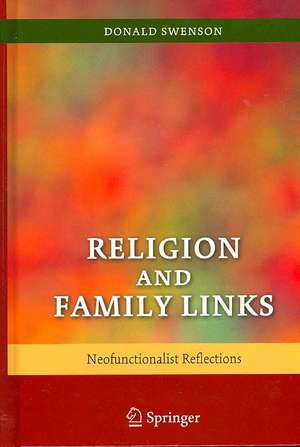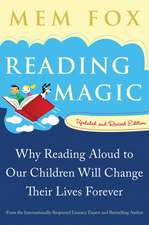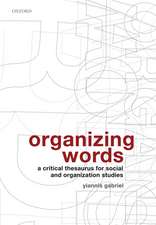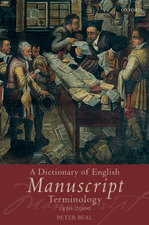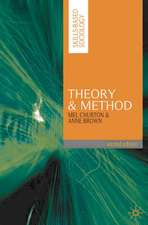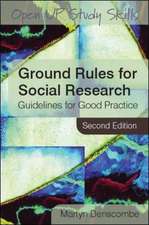Religion and Family Links: Neofunctionalist Reflections
Autor Donald Swensonen Limba Engleză Hardback – 26 dec 2007
Four systems that are embedded in the Neofunctionalist theoretical framework are presented: the chronosystem (including time and history), the organic system (that which is part of our biology), the personality system (with an accent on the individual in social context), the social system (everything to do with relationships and social organizations) and the cultural system (including mythology and ethos). The concepts from religion that create a unity include the idea of the sacred, religious experience, ritual, ethos and sacred organizations.
Another feature of the text is that it is not restricted to the modern era. Much of the research is historical in nature that assists the reader in understanding links of the two social phenomena in the light of the past. Further, whenever appropriate, literature will be drawn from folk religion, Christianity, Judaism and Islam.
| Toate formatele și edițiile | Preț | Express |
|---|---|---|
| Paperback (1) | 382.75 lei 43-57 zile | |
| Springer – 19 noi 2010 | 382.75 lei 43-57 zile | |
| Hardback (1) | 390.08 lei 43-57 zile | |
| Springer – 26 dec 2007 | 390.08 lei 43-57 zile |
Preț: 390.08 lei
Nou
Puncte Express: 585
Preț estimativ în valută:
74.64€ • 78.14$ • 61.76£
74.64€ • 78.14$ • 61.76£
Carte tipărită la comandă
Livrare economică 07-21 aprilie
Preluare comenzi: 021 569.72.76
Specificații
ISBN-13: 9780387756202
ISBN-10: 0387756205
Pagini: 190
Ilustrații: XII, 190 p.
Dimensiuni: 156 x 235 x 13 mm
Greutate: 0.46 kg
Ediția:2008
Editura: Springer
Colecția Springer
Locul publicării:New York, NY, United States
ISBN-10: 0387756205
Pagini: 190
Ilustrații: XII, 190 p.
Dimensiuni: 156 x 235 x 13 mm
Greutate: 0.46 kg
Ediția:2008
Editura: Springer
Colecția Springer
Locul publicării:New York, NY, United States
Public țintă
ResearchCuprins
Familial Links to the Sacred Neo-Functionalism and Religion.- The Chronosytem: A Social History of Religion and the Family Orientation.- The Organic System: Biology, Religion and the Family Orientation.- The Personality System: Religion having an Impact on the Individual and the Individual’s Influence on Religion in Familial Settings.- The Social System: Ritual and Social Organization.- The Cultural System: Mythology and Ethos.- Conclusions.
Textul de pe ultima copertă
Religion and Family Links
by Donald Swenson, Mount Royal College, Calgary, Alberta, Canada
For many, the experience of religion and the family are organically connected: first exposure to religion often comes through the family, and, in families that practice a religion, it often has a shaping effect on their traditions, roles, practices, or structure. The author of this text captures the important relationship between religion and the family with a review of relevant literature on the subject, synthesizing it within a theoretical framework. The work begins with an introduction to the neofunctionalist theoretical framework of the family. This framework is connected to a multidimensional understanding of religion. With a focus on systems and a holistic interpretation of religion, the author uses a systems approach to construct a synthesis of the salient literature on the link between religion and the family.
Four systems that are embedded in the Neofunctionalist theoretical framework are presented: the chronosystem (including time and history), the organic system (that which is part of our biology), the personality system (with an accent on the individual in social context), the social system (everything to do with relationships and social organizations) and the cultural system (including mythology and ethos).
These systems are unified by common religious concepts, including: the idea of the sacred, religious experience, ritual, ethos and sacred organizations. The author uses historical and modern examples from folk religion, Christianity, Judaism and Islam, creating a comprehensive resource for understanding the links between these two important social phenomena.
by Donald Swenson, Mount Royal College, Calgary, Alberta, Canada
For many, the experience of religion and the family are organically connected: first exposure to religion often comes through the family, and, in families that practice a religion, it often has a shaping effect on their traditions, roles, practices, or structure. The author of this text captures the important relationship between religion and the family with a review of relevant literature on the subject, synthesizing it within a theoretical framework. The work begins with an introduction to the neofunctionalist theoretical framework of the family. This framework is connected to a multidimensional understanding of religion. With a focus on systems and a holistic interpretation of religion, the author uses a systems approach to construct a synthesis of the salient literature on the link between religion and the family.
Four systems that are embedded in the Neofunctionalist theoretical framework are presented: the chronosystem (including time and history), the organic system (that which is part of our biology), the personality system (with an accent on the individual in social context), the social system (everything to do with relationships and social organizations) and the cultural system (including mythology and ethos).
These systems are unified by common religious concepts, including: the idea of the sacred, religious experience, ritual, ethos and sacred organizations. The author uses historical and modern examples from folk religion, Christianity, Judaism and Islam, creating a comprehensive resource for understanding the links between these two important social phenomena.
Caracteristici
Brings together research and theory on family and religion Shows how these two social institutions work – or don’t work together Author has background in both family studies and religious studies Includes supplementary material: sn.pub/extras
